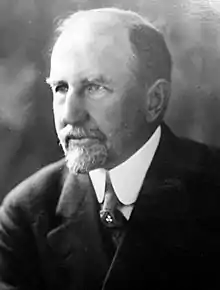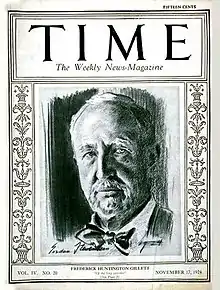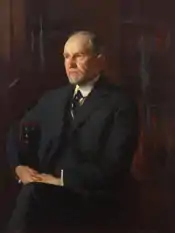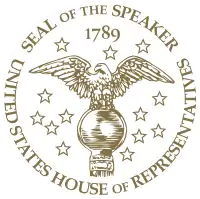Frederick H. Gillett
Frederick Huntington Gillett (/dʒɪˈlɛt/; October 16, 1851 – July 31, 1935) was an American politician who served in the Massachusetts state government and both houses of the U.S. Congress between 1879 and 1931, including six years as Speaker of the House.
Frederick H. Gillett | |
|---|---|
 | |
| 37th Speaker of the United States House of Representatives | |
| In office May 19, 1919 – March 3, 1925 | |
| Preceded by | Champ Clark |
| Succeeded by | Nicholas Longworth |
| Member of the U.S. House of Representatives from Massachusetts's 2nd district | |
| In office March 4, 1893 – March 3, 1925 | |
| Preceded by | Elijah A. Morse |
| Succeeded by | George B. Churchill |
| Leader of the House Republican Conference | |
| In office May 19, 1919 – March 3, 1925 | |
| Preceded by | James Robert Mann |
| Succeeded by | Nicholas Longworth |
| United States Senator from Massachusetts | |
| In office March 4, 1925 – March 3, 1931 | |
| Preceded by | David I. Walsh |
| Succeeded by | Marcus A. Coolidge |
| Member of the Massachusetts House of Representatives | |
| In office 1890–1891 | |
| Personal details | |
| Born | Frederick Huntington Gillett October 16, 1851 Westfield, Massachusetts, U.S. |
| Died | July 31, 1935 (aged 83) Springfield, Massachusetts, U.S. |
| Political party | Republican |
| Spouse(s) | Christine Rice Hoar |
| Alma mater | Amherst College Harvard Law School |
| Profession | Lawyer |
Early life
Frederick H. Gillett was born in Westfield, Massachusetts, to Edward Bates Gillett (1817–1899) and Lucy Fowler Gillett (1830–1916). He graduated from Amherst College, where he was a member of the Alpha Delta Phi fraternity, in 1874 and Harvard Law School in 1877. He entered the practice of law in Springfield in 1877.
Career

Gillett was the Assistant Attorney General of Massachusetts from 1879 to 1882. For two one-year terms he was a member of the Massachusetts House of Representatives. He was elected to the Fifty-third United States Congress in 1892.[1]
A Republican, Gillett served in the United States House of Representatives from 1893 to 1925. On January 24, 1914, he introduced legislation to initiate the adoption of an Anti-Polygamy Amendment to the U.S. Constitution.[2]
Republicans won a net total of 24 seats in the 1918 elections, increasing the size of their majority in the House. Gillett was nominated by the Republican caucus for Speaker of the House in the upcoming 66th United States Congress.[3] On May 19, 1919, Congress convened, and he was elected speaker, defeating the Democratic incumbent Champ Clark 228–172.[4] Gillett was expected to exercise less control than his predecessor, since he was characterized by one reporter as someone who did not drink coffee in the morning "for fear it would keep him awake all day".[5] He was reelected as speaker in 1921 and again in 1923.
In the latter year, due to the closeness of the margin of seats, there were multiple ballots before he was elected, a unique event in the 20th century.[6]
He decided to run for the United States Senate in 1924. He won the Republican primary easily over two other candidates[7] and then narrowly defeated incumbent Senator David I. Walsh in the Republican landslide of November 1924 led by President Calvin Coolidge, a former governor of Massachusetts.[8] Time magazine chose him for its November 17, 1924, cover.[9] He served one term in the Senate from 1925 to 1931, and decided not to seek re-election in the face of a difficult primary challenge.[10] In June 1930, he declined to state his position on prohibition or its repeal when queried by prohibition advocates.[11]
Personal life
On November 25, 1915, Gillett married Christine Rice Hoar, the widow of his former colleague in Congress, Rockwood Hoar.[12] In 1934 he published a biography of George Frisbie Hoar, an earlier congressman and senator from Massachusetts, and his wife's father-in-law from her previous marriage.[13]
During his time in Washington, Gillett spent his free time driving his 1926 Pontiac Coupe and playing golf in the morning. In retirement he wintered in Pasadena, California. He died in a hospital in Springfield, Massachusetts, on July 31, 1935.
Legacy

As of 2019, Gillett is the most recent Speaker of the House to have also served in the U.S. Senate. He was also the longest-tenured incumbent congressman to have ever been elected to the Senate until June 2013, when Representative Ed Markey was elected to the same Senate seat that Gillett held.[14]
References
- "Gillett Dies at 83; A Former Senator" (PDF). New York Times. July 31, 1935. Retrieved June 26, 2013.
- Iversen, Joan Smyth (1997). The Antipolygamy Controversy in U.S. Women's Movements: 1880 - 1925. NY: Routledge. p. 244. ISBN 9780815320791.
- "Gillett Chosen for Speakership of Next House" (PDF). New York Times. February 28, 1919. Retrieved June 26, 2013.
- Glass, Andrew (May 19, 2010). "GOP assumes control of Congress, May 19, 1919". Politico. Retrieved July 9, 2019.
- Margulies, Herbert F. (1996). Reconciliation and Revival: James R. Mann and the House Republicans in the Wilson Era. Westport, CT: Greenwood Press. pp. 191–8. ISBN 9780313298172.
- Heitshusen, Valerie; Beth, Richard S. (January 4, 2019). "Speakers of the House: Elections, 1913–2019" (PDF). CRS Report (RL30857). Washington, D.C.: Congressional Research Service. Retrieved July 9, 2019.
- "Gillett is Victor in Senate Contest; Couzens is Trailing" (PDF). New York Times. September 10, 1924. Retrieved June 26, 2013.
- "Republicans Make Gains in Congress" (PDF). New York Times. November 5, 1924. Retrieved June 26, 2013.
- "Frederick Gillett". Time. November 17, 1924. Retrieved June 26, 2013.
- "Observations from Times Watch-Towers" (PDF). New York Times. September 8, 1929. Retrieved June 26, 2013.
- "Women Taking Poll Say Many Senators Didge the Dry Issue" (PDF). New York Times. June 9, 1930. Retrieved June 26, 2013.
- "Gillett-Hoar Wedding" (PDF). New York Times. November 26, 1915. Retrieved June 26, 2013.
- "Senator Hoar" (PDF). New York Times. December 16, 1934. Retrieved June 26, 2013.
- Levenson, Michael (June 25, 2013). "Markey wins US Senate special election". Boston Globe. Retrieved June 26, 2013.
External links
- United States Congress. "Frederick H. Gillett (id: G000201)". Biographical Directory of the United States Congress.
- Rockwood Hoar Papers
- Westfield Athenaeum Archives
| Party political offices | ||
|---|---|---|
| Preceded by John W. Weeks |
Republican nominee for U.S. Senator from Massachusetts (Class 2) 1924 |
Succeeded by William M. Butler |
| U.S. House of Representatives | ||
| Preceded by Elijah A. Morse |
Member of the U.S. House of Representatives from Massachusetts's 2nd congressional district March 4, 1893 – March 4, 1925 |
Succeeded by George B. Churchill |
| Political offices | ||
| Preceded by Champ Clark |
Speaker of the United States House of Representatives May 19, 1919 – March 4, 1921; April 11, 1921 – March 4, 1923; December 3, 1923 – March 4, 1925 |
Succeeded by Nicholas Longworth |
| U.S. Senate | ||
| Preceded by David I. Walsh |
U.S. senator (Class 2) from Massachusetts March 4, 1925 – March 4, 1931 Served alongside: William M. Butler, David I. Walsh |
Succeeded by Marcus A. Coolidge |



